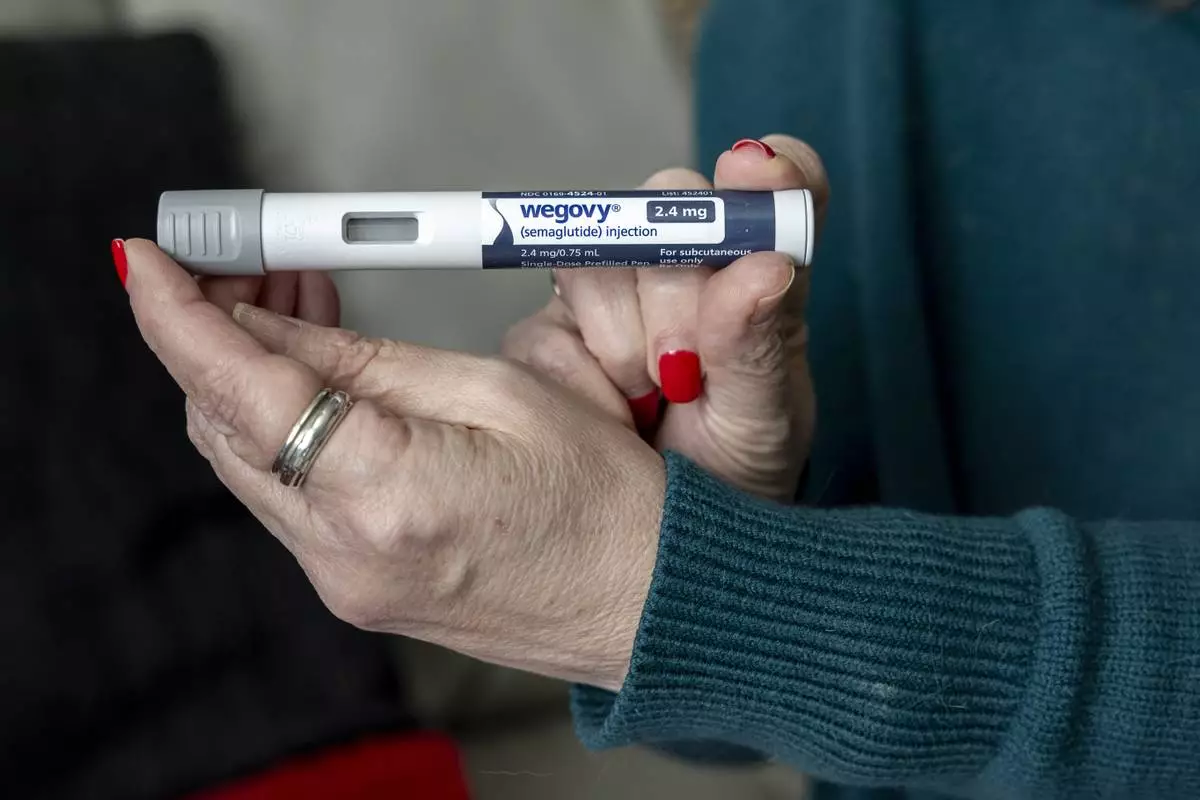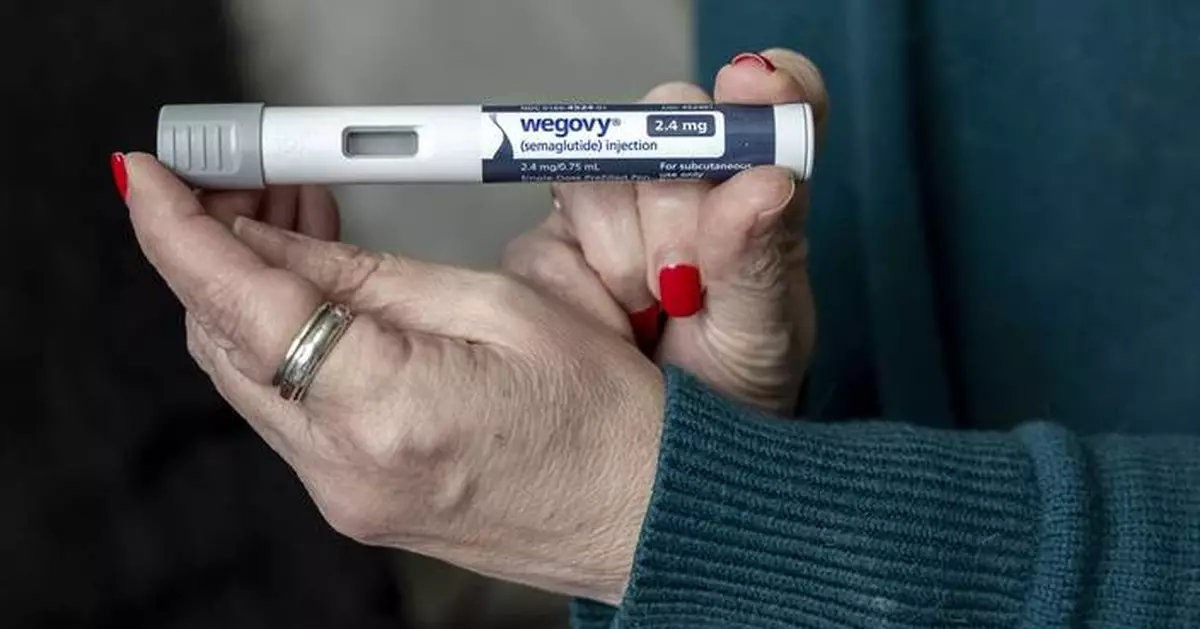WASHINGTON (AP) — Millions of obese Americans would get access to popular weekly injectables that would help them shed pounds quickly if a $ 35 billion proposal from the Biden administration is blessed by President-elect Donald Trump.
The rule, unveiled Tuesday by the Health and Human Services Department, would require Medicare and Medicaid to cover weight-loss drugs like Wegovy or Zepbound for a large segment of Americans who are obese.
But it's unclear if the proposal, which would not go into effect until after Trump takes office, will have support from his new administration — including from Robert F. Kennedy Jr., an opponent of the drugs whom the president-elect has tapped to serve as head of HHS.
Here's what to know about the drugs and the Biden administration's proposal:
The weight-loss drugs, also called anti-obesity medications or GLP-1s, mimic the hormone known as glucagon-like peptide 1, which regulates appetites by communicating fullness between the gut and brain when people eat.
The drugs include Novo Nordisk’s Wegovy and Ozempic as well as Eli Lilly’s Zepbound and Mounjaro.
In clinical trials, most participants taking Wegovy or Mounjaro to treat obesity lost an average of 15% to 22% of their body weight — up to 50 pounds or more in many cases. But a slice of “nonresponders” did not lose significant body weight.
Private health insurers have limited coverage of the drugs. Medicare has been barred from covering them under a law that says the program cannot pay for weight-loss products. Coverage through Medicaid, meanwhile, has varied from state to state.
That's meant the drugs — which can cost upwards of $1,000 monthly — have been largely unaffordable for many.
The rule announced Tuesday affects Medicaid, which provides health care coverage for roughly 70 million of the nation’s poorest people, and Medicare, the health insurance program for about 67 million older Americans.
Under the proposal, the Centers for Medicare and Medicaid Services, or CMS, would reinterpret the federal law, to consider the drugs as a treatment for obesity diseases.
The nation's top health agency estimates as many as 3.5 million people on Medicare and 4 million on Medicaid could qualify for coverage of the drugs. But research suggests far more people might qualify, with the Centers for Medicare and Medicaid Services estimating roughly 28 million people on Medicaid are considered obese.
And the proposal would cost a lot of money — at least $35 billion over the next decade.
The drugs are popular — with a majority of Americans telling health firm KFF in a poll earlier this year that Medicare should cover the drugs. A bipartisan coalition of lawmakers, too, has lobbied for coverage of the drugs.
But support is mixed in Trump’s inner circle.
Kennedy has railed against the idea of Medicare or Medicaid covering the drugs. Instead, he's told Congress that they should expand coverage of healthier foods and gym memberships through the government-sponsored health care programs.
Meanwhile Dr. Mehmet Oz, who is poised to take the helm of CMS, has said the drugs can be a helpful tool. In a video posted to Instagram last year, Oz praised some of the benefits of the drugs, but said the long-term effects should be further studied.
“I think these new generation of medications offer us a huge opportunity,” Oz said.
Trump or Kennedy could ultimately ignore Biden's proposal and not implement it.
Some lawmakers praised the move on Tuesday, while others expressed skepticism.
Rep. Brad Wenstrup, a Republican who sponsored a bill to have Medicare cover the weight-loss drugs, has argued that covering the drugs and other obesity treatments could save taxpayers in the long run.
“I am encouraged to see the Administration support our efforts to help make Americans healthier by allowing Medicare coverage of new, physician prescribed and FDA approved anti-obesity medications," Wenstrup said in a statement.
He called for the Congress to pass a law that would help pay for dietitians, nutritionists and behavioral therapy to treat obesity.
Sen. Bernie Sanders, however, warned that unless the government required drugmakers to lower the price of the medications Medicare premiums would “skyrocket" under the plan.
It's good for more Americans to have access to these drugs, which have proven effective, but Dr. David Ludwig, a nutrition and obesity expert at Harvard University, hopes that it doesn't become the primary way obesity is treated in America.
He worries that not enough investment is being made to figure out what is driving climbing obesity rates across the U.S., and the role that healthy foods and exercise might play in solving that epidemic.
“It’s appropriate to treat the problems that we now face with drugs, but let’s not stop there,” Ludwig said. “Let’s identify what’s causing the problem, and ultimately rely on these drugs — which have side effects — less and less over time.”
Dr. Andrew Kraftson, who treats obese patients at the University of Michigan, is happy that more of his patients might be able to afford these drugs, which he has prescribed for patients and has had successful results. But he, too, would like to see more research and guidance from the government on prescribing the medications.
Kraftson also worries about some of the side effects for elderly patients. The drugs, he points out, can lead to muscle loss, which is a bigger problem for older Americans who are at risk of falling, for example.
“I'm advocating for their thoughtful use,” Kraftson said. "Because if you have a senior and you just write a prescription and the visit takes five minutes, is that an appropriate level of care? Have we defined that well?

FILE - Donna Cooper holds up a dosage of Wegovy, a drug used for weight loss, at her home, March 1, 2024, in Front Royal, Va. (AP Photo/Amanda Andrade-Rhoades, File)










